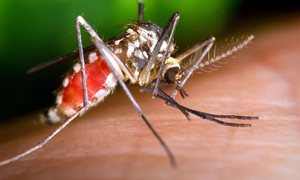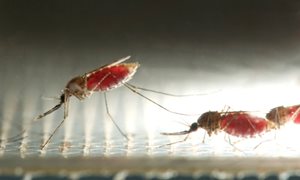 Genetic predisposition is of great influence on the regulation of immune responses, but nongenetic factors, such as the composition of our microbiome, also play an important part in this. By using this genetic and nongenetic information as input for a computer model, researchers at Radboud university medical center and the University Medical Center Groningen (UMCG) were able to predict whether test subjects would develop an adequate immune reaction to certain infections. The results of this research were published in Nature Immunology.
Genetic predisposition is of great influence on the regulation of immune responses, but nongenetic factors, such as the composition of our microbiome, also play an important part in this. By using this genetic and nongenetic information as input for a computer model, researchers at Radboud university medical center and the University Medical Center Groningen (UMCG) were able to predict whether test subjects would develop an adequate immune reaction to certain infections. The results of this research were published in Nature Immunology.
The functioning of the immune system greatly varies from person to person. This means that while one individual may be protected against certain pathogens, another one will get sick. However, little is known about the causes of this variation. To gather additional knowledge on the subject, researchers at the UMCG and Radboud university medical center mapped genetic and nongenetic factors that regulate the intensity of the immune response.
Cytokines
In the study, the researchers analyzed the immune reactions of some 500 test subjects from the Human Functional Genomics Project. They isolated the subjects’ blood cells, to which they added pathogens in a laboratory environment. The pathogens ranged from bacteria to fungi and viruses. The researchers subsequently measured the molecules with an important regulatory role in the immune response: cytokines. Blood cells excrete cytokines when they detect intruders.Immune reaction
The researchers compared the results from the cytokine measurements to a very large amount of medical data of the 500 individuals, including genetic predisposition, composition of the microbiome, cholesterol levels and other metabolic products. These comparisons allowed the researchers to determine which factors most influence the production of cytokines, and as such a proper immune reaction.Mathematical model
The genetic predisposition of the test subjects turned out to be the primary factor regulating the immune response. Additionally, it was shown that the combination of nongenetic factors plays an important part in the regulation of the immune response. “We have developed a mathematical model that, based on the readily available ‘big data’, predicted which individuals would develop an adequate immune response against certain infections,” says Professor of Experimental Internal Medicine Mihai Netea.Predictions
The model showed that the capacity to produce cytokines correlates with the predicted genetic risk of contracting complex diseases. Researcher Yang Li: “It is expected that by using such models in the future, we will be able to predict which individuals are protected against certain infections, and who should be careful and perhaps take precautions.”Explaining differences
Until now, the influence of genes and environmental factors on the variation in cytokine production had only been investigated in minor studies, with a limited variety of pathogens. The Human Functional Genomics Project, led by Professors Mihai Netea and Leo Joosten of Radboud university medical center, Professor Cisca Wijmenga of the UMCG, and Professor Ramnik Xavier of the Broad Institute at MIT and Harvard, intends to change this. Over the next few years, they will investigate several groups consisting of hundreds of healthy individuals and patients to find an explanation of the differences in cytokine production, making this the largest study on this subject to date.Related news items

Grants for research on magnesium deficiency and malaria Vidis for Felix Hol and Jeroen de Baaij
1 July 2022 Radboudumc researchers Jeroen de Baaij and Felix Hol both receive an NWO Vidi grant for their research, respectively on magnesium deficiency in type 2 diabetes and on malaria. go to page
Field research on malaria vaccine offers unexpected surprise
23 May 2022Field research on the effectiveness of a malaria vaccine, came up with unexpected results for an international group of researchers including Benjamin Mordmüller of Radboudumc. The vaccine evokes a broader response against malaria proteins than there are in the vaccine.
go to page
Rubicon grants awarded to three RIMLS researchers
19 April 2022Three researchers have received Rubicon funding from NWO/ZonMw. This will enable Elke Muntjewerff, Laura de Vries and Laurens van de Wiel to do research at a foreign research institute for the next two years.
go to page


